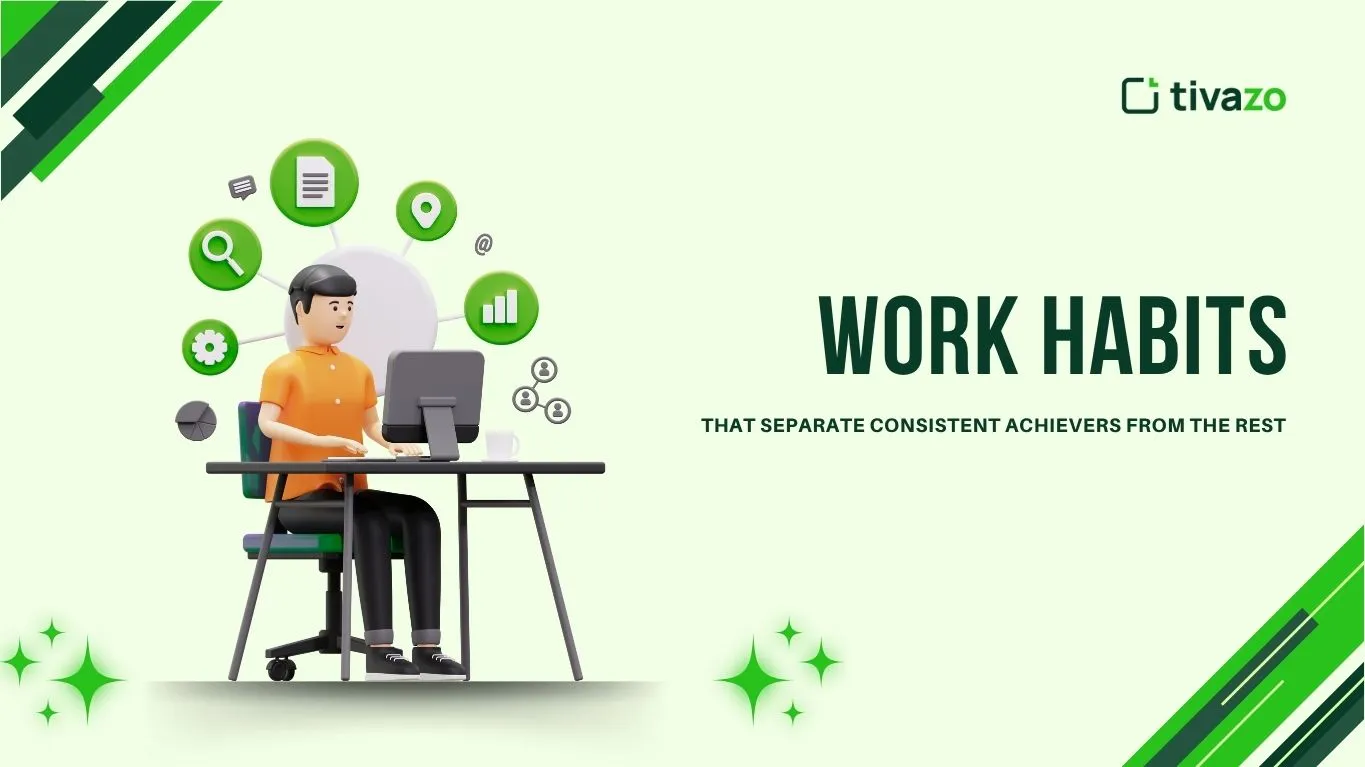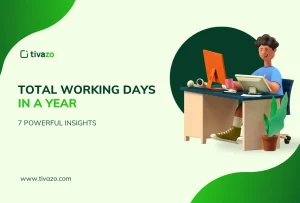Work habits are the behaviors, actions, and routines we do consistently every day when we work. These can be intentional (for example, creating tomorrow’s task list every evening) or unconscious (for example, immediately checking emails when you wake up). Skills and raw talent matter, but it’s how we habitually work daily that determines success long-term.
So, why does this matter? Habit can automate behavior. When we build healthy work habits, we are less likely to fall back on motivation or willpower, and instead, excellence becomes our automatic default. Even world-class performers: athletes, CEO’s, artists, often are dependent on strong work patterns as opposed to botched talent.
Key Highlights:
- 5 Signs You Have Poor Work Habits
- 5 Powerful Work Habits That Improve Focus and Daily Productivity
- Daily Work Habits to Maximize Focus and Save Hours
- Work Habits vs Productivity Hacks: What Works?
- How Long Does It Take to Build New Work Habits?
5 Signs You Have Poor Work Habits
Before we begin to shape and create better work habits, it is important to identify the habit patterns that are holding you back. So often, those notoriously bad work habits are so heavily automated, unconscious, or normalized that we don’t even understand they’re degrading our productivity (and health). Identifying those hidden traps and pitfalls is essential to creating more intentional and focused workdays and taking purposeful steps towards breaking unproductive cycles.
- Checking notifications first thing in the morning: This fractures your attention before your brain is even awake.
- Multitasking on important tasks: the more things you do at once, the lower the quality and the more stress there will be.
- Letting your day “happen” without any planning: If your day has no daily structure, you’ll mentally feel ‘cluttered’ and lose hours.
- Not taking breaks or lunch: This creates a feeling of burnout.
- Not ending your day with a review: You will never learn, reflect, or complete a proper closure.
Do you recognize these? Well, good, that means you are already on your way to better work habits.
The Science of Building Better Work Habits
To make a habit, your brain is essentially building a loop: cue → routine → reward.
- Cue: a trigger (like, you open your laptop)
- Routine: the action (checking your email)
- Reward: satisfaction, or relief (you feel caught up)
It is important to understand this loop if you want to break bad habits or develop better habits. Say your current routine is to open Slack the moment you sit down, instead, set up your routine to open your task manager or journal.
5 Powerful Work Habits That Improve Focus and Daily Productivity
Let’s break down the good work habits that separate top achievers from the rest.
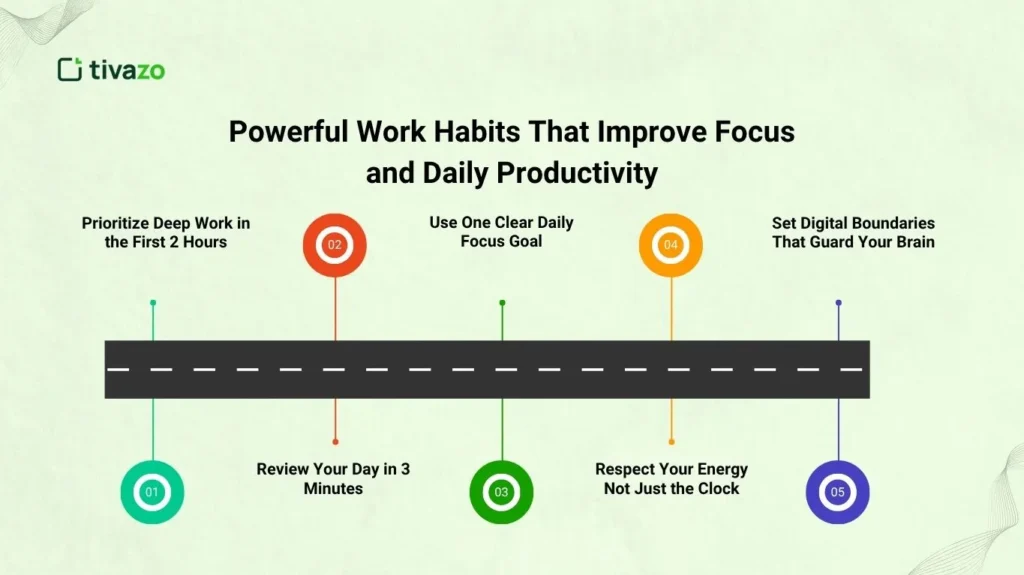
1. Prioritize Deep Work in the First 2 Hours
Deep work involves fully concentrating on tasks that require your highest levels of cognitive intensity, such as complex problem-solving, creative work, and strategic planning. After a good night’s rest, your brain is naturally at its sharpest in the morning. For this reason, the early morning hours are the perfect time for deep work, while distractions are minimized.
By planning to use this important time for uninterrupted focus—no emails, meetings, or social media, etc.—you allow your brain to function at its highest capacity. This habit not only increases effective productivity but also sets each of your working days off on a successful note, marked by deep work and ongoing productivity, with a flow that follows you throughout your day.
2. Review Your Day in 3 Minutes
Taking a few minutes at the end of your work day to review what you have accomplished can greatly enhance your consistency and clarity. By making this a habit, you are training your brain to identify progress, distractions, and be mindful of your experience daily.
Ask yourself: What did I accomplish today? What distracted me? What is the vital task for tomorrow? This is a simple daily ritual that helps you conclude each work day with intentionality, by transforming your lack of focus into deliberate progress on a journey and framing your brain positively for the next day, so that you can hit the ground running in the morning.
3. Use One Clear Daily Focus Goal
When you attempt to manage every priority at once, it tends to spread your focus and lessen your effectiveness. Fortunately, high performers’ daily priority is to focus their energy on one goal every day that improves their workflow efficiency, an even non-negotiable outcome the one outcome they believe advances the priority’s effectiveness.
The clear goals serve as a focus for making decisions and ignoring anything that distracts them from the focus. All high performers should start their day by evaluating what the clear goal for the day is and keeping it at the top of their list. Keeping that goal obvious creates focus in their day and turns their workflows into daily activities that have power and direction.
4. Respect Your Energy, Not Just the Clock
No hour of the day is the same. You shouldn’t operate just based on the clock; you should listen to your body’s natural energy flow. Some people rise and grind in the morning when they are most focused; others feel the most alert when they wake up from their mid-afternoon nap. Keeping track of your energy levels and when you are most naturally energetic and focused will help you determine the best time to schedule your most demanding, high-quality work.
Tivazo is a tool that can track when you are at your most focused and energized point of the day to devise a smarter plan you can execute with ease during your natural flow of energy rather than attend to work at less optimal states of focus and energy.
5. Set Digital Boundaries That Guard Your Brain
Modern work is constantly bombarded with notifications, emails, or instant messages, each is a potential disruption that splinters your focus and annihilates your flow. The smartest workers try to manage their digital inputs by creating a set of clear boundaries. Maybe this means utilizing “Do Not Disturb” or “Focus” modes for whichever periods you want to focus, checking emails just two times a day at specific times, or muting needless alerts from apps.
By protecting your brain’s input from interruption, you enhance mental clarity, allow deeper episodes of concentration, and engage in sustainable productivity throughout your day.
Daily Work Habits to Maximize Focus and Save Hours
Constructing your day around your everyday productive habits is the strategy to maximize your focus on time and regain hours you are losing. By intentionally structuring your work in alignment with your internal energy flow and cognitive load, you are not only working more easily and more effectively, but you also won’t have to work harder.
Our routine prioritizes demanding work in peak periods, low-energy tasks during tired energy flows, and time for reflection and rest. Developing a structure/method of working from your daily routine allows you to build momentum, avoid decision fatigue, and salvage hours each week, all while maintaining equilibrium and preventing burnout. Below is a diagram of a high-impact day in action:
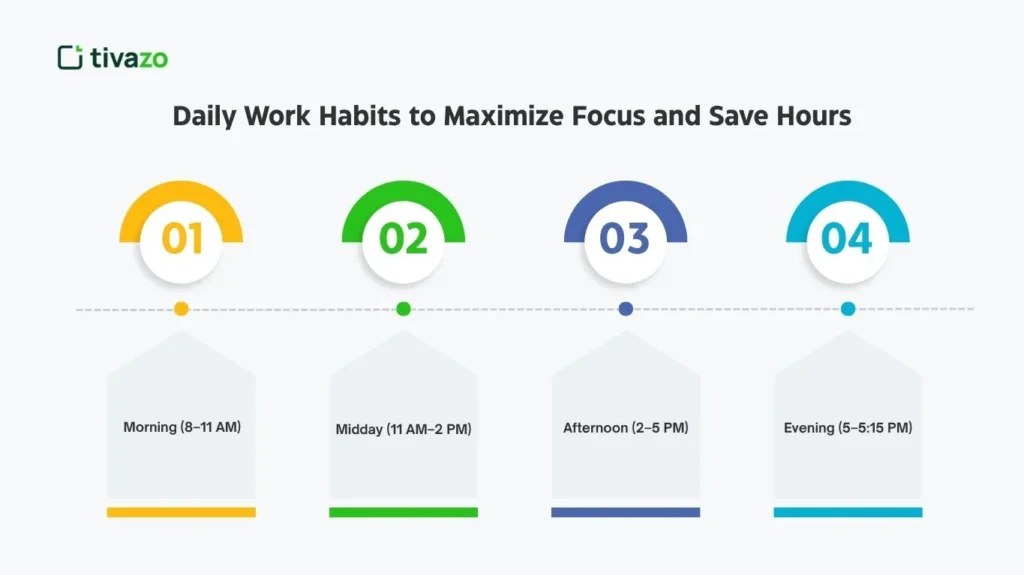
Morning (8–11 AM)
- Dedicated Deep Work
- No meetings or emails.
- Music/noise-cancelling to assist.
Midday (11 AM–2 PM)
- Light Administration Tasks
- Check Slack/email in batches
- Take a stand/walk break
Afternoon (2–5 PM)
- Collaboration & meetings
- Creative Ideation
- Review of tasks + planning for the next day.
Evening (5–5:15 PM)
- 3-minute review of the day
- Task list for tomorrow
- Shutdown to rest the brain
Common Myths About Work Habits (Debunked with Reality)
There are many common misconceptions about work habits that may seem accurate but prevent people from making impactful change. I’m going to dispel some of the biggest misconceptions to shed some light on the truth:
“I need motivation to form habits”:
This is one of the largest misconceptions. Motivation is fleeting. It comes and goes with the waves. Depending on motivation alone is like waiting for a perfect day to go for a run; it will rarely show up when you want it to. Habits are formed through consistent repetition over time.
The more you repeat a behavior in response to the same cue, the more it becomes a reaction that doesn’t require motivation. This means that the *real* secret to building good, productive habits is to start small and do the work when you don’t want to.
“Waking up early = success.“
If you’ve ever heard the mantra, “The early bird gets the worm,” and have followed it blindly by getting up early every day, you may not know that waking up early isn’t the best thing for everyone. While waking up early can be a tailwind for some people, success is not about how early in the day you begin; it’s what you can accomplish in the hours you are awake.
A night owl that has deep focus and completes high-priority activities quickly can easily outperform an early riser with poor focus who wastes their mornings on distractions. What matters is finding a way for your work to align with your optimal energy rhythms, sustaining a consistent but productive routine no matter what time of day it
“Multitasking is efficient.”
Initially, multitasking seems like a clever way to be more efficient. In reality, research indicates that the shift in focus from one task to another has productivity costs that amount to reductions of as much as 40%. Each time we switch tasks, it takes the brain time to refocus, which consumes mental energy and increases errors.
Instead, developing work habits that emphasize single-tasking and deeper focus yields bigger, better-quality results, speedier completion rates, and less anxiety.
“Busy is equal to Productive“:
Many confuse busy and productive, and while there are certainly instances when they can overlap, they are not synonyms. Being busy and productive are often two very different pursuits. Using your day to fill in meetings, respond to emails, and be constantly active may make you feel important, but it typically results in burned energy, scattered efforts, and ultimately burnout.
Smart workers develop work habits that are less busy activities, and more prioritization of meaningful outcomes. This means establishing goals, keeping focused on the biggest impact tasks, and tracking and reflecting on progress to ensure that we make every action count toward goal completion.
Good vs Bad Work Habits
Comparison between Good vs Bad work habits is:
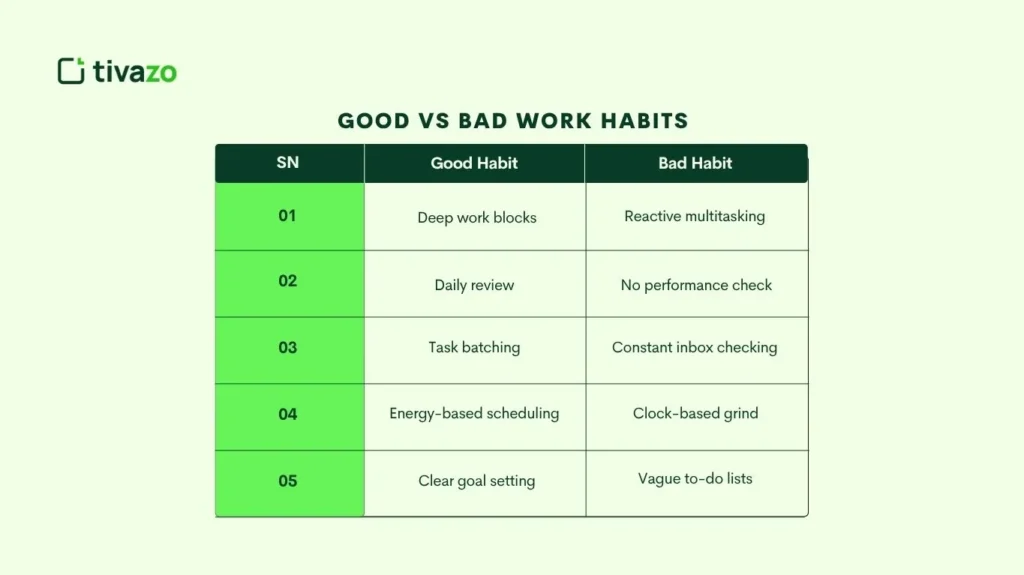
How to Adapt Work Habits Based on Your Environment (Remote, Office, Hybrid)
The first step towards working more easily in your surroundings is, at some point, adapting your habits to fit your environment. This is very important for the delivery of productive work while in motion within whatever context it may be ( remote, office, hybrid). For remote workers, just as you can take the visual aspects of remote work away by creating a workspace, you can tap the brain’s signals of time to work-time to relax by creating lines.
Moving your activities from your bed, the couch, or a hotspot will allow you to experience work in a focused sense, without the worry of it blurring into rest and home time. In the office, time boxing meetings will continue the flow of your day’s schedule without any other concurrent work, and you won’t forget to complete an allocation of specific important moments in time. Using headphones while working will support your concentration and block distractions, allowing you to be completely focused. Blocking small talk reminders will formally allow you to intentionally protect your time slice as appropriate.
For those a hybrid environments, maintaining a consistent routine (and digital tools) across your locations is important to stay organized and reduce the friction of moving across and swapping workspaces. Either way you slice the cake, your environment plays a powerful part in your work habits, so planning them carefully is critical in allowing you to work smarter and sustain flow.
How Long Does It Take to Build New Work Habits?
While the conventional thinking is that it only takes 21 days to form a habit, conclusions from several health psychology experts indicate that, on average, it takes about 66 days before a behavior becomes automatic. This timeframe is dependent on the intricacy of the habit as well as the idiosyncrasies of the individual.
What you want to take away here is that building sustainable habits isn’t about how fast you can build them but rather, how you commit to showing up consistently, even when you are unmotivated. So if you miss a day here and there, that will not matter so long as you come back and keep going quickly. One way to help support habit to form is to track only one habit at a time for at least 30 days, and celebrate small wins weekly to help maintain as positive momentum as possible.
Make sure you don’t feel overwhelmed yourself by trying to change a multitude a behaviors simultaneously. By focusing on less, you are able to maintain a steady pace of progress, which will help your brain wire new routines, making intentional actions into effortless habits. Develop habits that will aid your productivity and help support success over the long haul.
Final Thoughts: Your Future Is Hidden in Your Daily Habits
You don’t need hacks. You don’t need perfect motivation. You need better work habits that work for you, even on days you feel off.
Every little habit is a vote for the type of worker, leader, and person you’re becoming. Stack those votes every day, and success will become unavoidable.
So choose one. Master it. Let it change your trajectory.
FAQs
How do you describe your work habit?
You describe it by explaining how you manage time, handle tasks, stay focused, and maintain consistency.
What are the five good work habits?
Deep work, daily reviews, task batching, clear goals, and digital boundaries.
Why is it important to have good work habits?
Good habits boost productivity, reduce stress, and help you perform consistently without relying on motivation.
How do I break bad work habits?
Identify triggers, replace them with better routines, and repeat daily until they become automatic.
How long does it take to build a new work habit?
On average, it takes 66 days of repetition for a new habit to stick.
Can work habits affect mental health?
Yes — poor habits increase stress and burnout, while good habits support balance and focus.
